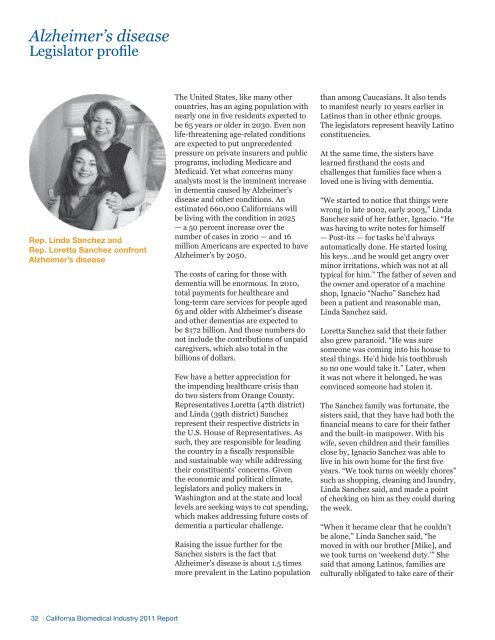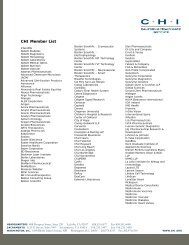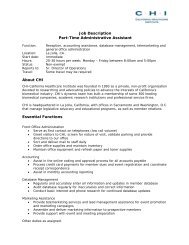Alzheimer’s diseaseLegislator profileRep. Linda Sanchez andRep. Loretta Sanchez confrontAlzheimer’s diseaseThe United States, like many othercountries, has an aging population withnearly one in five residents expected tobe 65 years or older in 2030. Even nonlife-threatening age-related conditionsare expected to put unprecedentedpressure on private insurers and publicprograms, including Medicare andMedicaid. Yet what concerns manyanalysts most is the imminent increasein dementia caused by Alzheimer’sdisease and other conditions. Anestimated 660,000 <strong>California</strong>ns willbe living with the condition in 2025— a 50 percent increase over thenumber of cases in 2000 — and 16million Americans are expected to haveAlzheimer’s by 2050.The costs of caring for those withdementia will be enormous. In 2010,total payments for healthcare andlong-term care services for people aged65 and older with Alzheimer’s diseaseand other dementias are expected tobe $172 billion. And those numbers donot include the contributions of unpaidcaregivers, which also total in thebillions of dollars.Few have a better appreciation forthe impending healthcare crisis thando two sisters from Orange County.Representatives Loretta (47th district)and Linda (39th district) Sanchezrepresent their respective districts inthe U.S. House of Representatives. Assuch, they are responsible for leadingthe country in a fiscally responsibleand sustainable way while addressingtheir constituents’ concerns. Giventhe economic and political climate,legislators and policy makers inWashington and at the state and locallevels are seeking ways to cut spending,which makes addressing future costs ofdementia a particular challenge.Raising the issue further for theSanchez sisters is the fact thatAlzheimer’s disease is about 1.5 timesmore prevalent in the Latino populationthan among Caucasians. It also tendsto manifest nearly 10 years earlier inLatinos than in other ethnic groups.The legislators represent heavily Latinoconstituencies.At the same time, the sisters havelearned firsthand the costs andchallenges that families face when aloved one is living with dementia.“We started to notice that things werewrong in late 2002, early 2003,” LindaSanchez said of her father, Ignacio. “Hewas having to write notes for himself— Post-its — for tasks he’d alwaysautomatically done. He started losinghis keys…and he would get angry overminor irritations, which was not at alltypical for him.” The father of seven andthe owner and operator of a machineshop, Ignacio “Nacho” Sanchez hadbeen a patient and reasonable man,Linda Sanchez said.Loretta Sanchez said that their fatheralso grew paranoid. “He was suresomeone was coming into his house tosteal things. He’d hide his toothbrushso no one would take it.” Later, whenit was not where it belonged, he wasconvinced someone had stolen it.The Sanchez family was fortunate, thesisters said, that they have had both thefinancial means to care for their fatherand the built-in manpower. With hiswife, seven children and their familiesclose by, Ignacio Sanchez was able tolive in his own home for the first fiveyears. “We took turns on weekly chores”such as shopping, cleaning and laundry,Linda Sanchez said, and made a pointof checking on him as they could duringthe week.“When it became clear that he couldn’tbe alone,” Linda Sanchez said, “hemoved in with our brother [Mike], andwe took turns on ‘weekend duty.’” Shesaid that among Latinos, families areculturally obligated to take care of their32 | <strong>California</strong> <strong>Biomedical</strong> <strong>Industry</strong> 2011 Report
families themselves; to institutionalizean elder is seen as shameful. But whenIgnacio began to slip out of the housewhen no one was watching, the familyrealized that his disease had progressedbeyond their ability to keep him safe.The decision to move their father intoa nursing home was not the first toughreality the family had encountered ashis condition worsened.Loretta Sanchez said that getting basicinformation on Alzheimer’s was achallenge. “We didn’t know anythingabout Alzheimer’s,” she said. They metwith a counselor who specializes incaring for loved ones with dementiaand were surprised by how little of whatthey could do came instinctively. Forinstance, they had installed securitycameras at Ignacio’s home in hopes ofmaking him feel safer. Yet the counselorscolded them for “feeding his paranoia.”Linda Sanchez said it was particularlydifficult to take over decisions for theirfather, who had always been so capableand independent. Establishing suchlegal arrangements as deciding whowould have power of attorney, makemedical decisions and oversee thefinancial planning are tough steps. Bothsisters mentioned the financial toll ofthe disease and the time commitment— time taken away from work, children,friends and other activities.So what does a legislator who has afiscal responsibility to her country,a leadership commitment to herconstituency, and firsthand knowledgeof the debilitating realities of dementiarecommend?Both Sanchez sisters acknowledge thatfunding is a hard sell in Washingtonnow. In 2009, Linda Sanchezintroduced the Cure and Understandingthrough Research for Alzheimer’s (LaCURA) Act. The bill sought to increasefunding for the NIH and the Centersfor Disease Control and Prevention(CDC) to conduct adequate Alzheimer’sresearch, outreach and education.“It was, unfortunately, a victim offinancial constraints,” Linda Sanchezsaid. “People are concerned about‘unnecessary spending.’” She reiteratedthat she believes that the impendinggrowth in the number of Alzheimer’spatients will “create an emotional,financial and economic crisis that willnecessitate action,” and that upfrontinvestments would be less costly andmore effective than the expensesincurred by waiting.There are steps that can and should betaken now that would not necessitatesignificant new government spending,the Sanchezes said. One would be toensure that the available informationreaches a wider audience, a task thatcould include translating materials intoother languages, making them moreculturally sensitive and disseminatingthem more effectively to underservedpatient and caregiver populations.Similarly, consolidating information onavailable resources would be helpful tocaregivers, who often are overwhelmed.Another important step would be toensure that more minority subjects areincluded in Alzheimer’s and dementiastudies and clinical trials.Ignacio Sanchez was one of thefew Latinos enrolled in an memoryand aging trial at the University of<strong>California</strong>, Irvine. Studies also areongoing at the University of Southern<strong>California</strong> Memory and Aging Center.With their proximity to ethnicallydiverse and underserved populations,the universities’ commitment toinvolving more Latinos and other ethnicgroups is feasible and appropriate,Linda Sanchez said.Both congresswomen applauded thecooperative efforts of researchers,industry and government in seekingnew understanding of Alzheimer’s aswell as new therapies for the disease.Supporting that work into the futurewill require added funding, which couldcome in the form of government grantsand, Linda Sanchez suggests, throughprivate-public partnerships.Looking aheadLinda Sanchez notes that societyneeds to be gearing up right now forthe increased demand for care forAlzheimer’s patients. “The [Alzheimer’scare] industry is expected to doubleas the Baby Boomers age,” she said.“There are no standards for care, nostandards for training. There is a highvacancy rate for care providers anda high turnover rate.” She said thatregulators and employers need toestablish training programs, pay scalesand working environments to ensurethat Alzheimer’s care staff stay in thefield and are prepared to provide thenecessary care as the patient population“explodes.”<strong>California</strong> <strong>Biomedical</strong> <strong>Industry</strong> 2011 Report | 33






